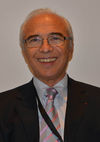Jean-Jacques Subrenat
 |
 | ||
| Country: | France | ||
| Website: | |||
| LinkedIn: | |||
|
| |||
Jean-Jacques Subrenat is a former French Ambassador. He is currently a member of the NTIA IANA Functions' Stewardship Transition Coordination Group (ICG). Served on the ALAC, twice appointed by ICANN's NomCom, 2010-2012, again 2012-2014.[1]. Soon after joining the ALAC, Subrenat proposed that this Advisory Committee, while continuing its valuable work on ongoing business, take a longer-term and broader view of the Internet's and ICANN's future. His proposal was accepted, and the ALAC set up its Future Challenges Working Group (FCWG), of which he is the current Co-Chair. The FCWG produced the ALAC White Paper "Making ICANN Relevant, Responsive and Respected" (R3)], in the 6 UN working languages [2]
Subrenat is a former member of the ICANN Board, appointed by the NomCom, 2007-10.[3]. During his service on the Board, he was (successively or simultaneously) active in several Committees: President's Strategy Committee (where he was one of the authors of the "Implementation Plan for Improving Institutional Confidence"); Board Governance Committee; Structural Improvements Committee; Public Participation Committee (as its first Chair); for over 2 years he advocated Board oversight on international and institutional relations, which until then was the exclusive domain of the CEO and senior management, and his suggestion was finally taken up to create the Global Relationships Committee, of which he was one of the inaugurating members. Mr. Subrenat also served on several Board Working Groups: ALAC Review, Board Review, ccNSO Review (as its Chair).
Subrenat has noted that he is "self-educated" with regards to the Internet.[4] He has been involved in international Internet governance fora in the past decade, including the IGF.[5][6]
Articles, comments & videos about the Internet edit
- Subrenat's contributions to the industry blog, CircleID, can be found here.
- Subrenat speaking on the Multistakeholder Model and the role of governments within ICANN (interviewed by Glenn McKnight):
Professional experience edit
Ambassador Subrenat was a French diplomat, 1971-2005. Among other assignments, he was on the Policy Planning Staff (1976-78); seconded to the Ministry of Industry to help set up the Solar Energy Authority, where he created and led the international affairs department (1978-80); Diplomatic Adviser to the Minister for Europe (1980-81); Deputy director for Asia and the Pacific (1984-86); Alternate director for development aid (1986-88); Alternate director for the Americas (1992-95).[7] He went on to serve as Ambassador to the Western European Union in Brussels (1995-1998), to Estonia (1998-2002), and Finland (2002-2005).[8] He acted as interim Governor for France on the Board of Governors of the Asia-Europe Foundation ASEF in 2005. He retired from diplomatic service in 2005.[9]
Other activity includes:
- Volunteer, French Navy, 1960-63.
- Scholarship student, 1964-66.
- Researcher, CNRS, 1967-1971.
- Tutor, Institut International d'Administration Publique, 1986-88.
- Chairman of the Advisory Board, Institut Pierre Werner, 2007-10 (voluntary, part time).
- Senior advisor to the board of CCRN (Centre culturel et de rencontre Neumunster), which he represented in EUNIC (European Union National Institutes for Culture network), 2009-10 (voluntary, part time).
- Tutor, Ecole nationale d'administration, Strasbroug, 2007-08 [10] (part time).
Publications edit
- Subrenat is the editor of Estonia - Identity and Independence;[11];
- author of Listen, There's Music From the Forest: a Brief Presentation of the Kuhmo Chamber Music Festival in English and French.
Education, training edit
Jean-Jacques Subrenat holds a doctoral degree ("Doctorat du troisième cycle") in history from the Sorbonne University in Paris, and other degrees from Bordeaux, Osaka, Paris.[12]
References edit
- ↑ At Large ALAC and RALO Elections Selections and Appointments 2012, Community.ICANN.org
- ↑ At Large Future Challenges, ICANN.org
- ↑ icann.org
- ↑ Bios, ICANN.org
- ↑ Panelist Bio View, IntGovForum.org
- ↑ Emerging Issues, Elon.edu
- ↑ icann.org
- ↑ Jean Jacques Subrenat, en.Wikipedia.org
- ↑ worldlingo.com
- ↑ icann.org
- ↑ Baltic, Rodopi.nl
- ↑ aseminfoboard